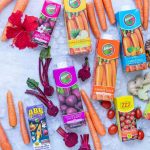Foods to reduce your risk of Cancer
Even though many factors may impact your cancer risk, eating the right foods and avoiding others play a large role. Here are some pointers. Try to find fun and creative ways to make them a part of your daily self-care:
Lifestyle
About 30-40% of cancers can be reduced through improving our lifestyle, the quality of the food we eat, stopping tobacco smoking, reducing alcohol intake, managing weight and exercising. Diet, physical activity and being overweight may affect body processes that influence the forming of cancer cells .
My daily soup or salad… or both?
Bringing colour into our lives, vegetables and fruits offer a host of plant chemicals that have amazing cell-protective and anti-cancer properties. Some of these plant chemicals include carotenoids, flavonoids, isothiocyanates and anthocyanins. Vitamins C and E, folic acid, selenium and dietary fibre found in vegetables and fruits are also important for cancer risk reduction. Foods high in carotenes may help reduce breast cancer risk.
Go green or yellow, orange or red!
Dark green leafy vegetables are not only packed with carotenes but also a source of vitamin C, E, folic acid and fibre. The ones usually mentioned include spinach, chard, lettuce, kale, bok choy cabbage, and rocket. However, celery leaves, the tops of carrots and beetroot greens offer similar nutrients. So, get creative with adding them to your dishes whether in soups, stir-fries, pesto’s or morning green juices. Not forgetting local traditional indigenous leafy vegetable morogo (or imifino/ muhuro) which is another carotenoid compact.
Carotenoids are also found in carrots, pumpkin, butternut, sweet potatoes, peppers, tomatoes and orange, red and green fruits.
Eat your broccoli!
Broccoli, Brussel sprouts, cabbage, cauliflower and watercress are some of the cruciferous family known not only for carotenoids, fibre, vitamins and minerals but also isothiocyanates, which in animal and cell studies has shown anti-cancer effects (though more studies in humans are needed).
Add some berries and pomegranates
These fruits have fibre, vitamins and minerals but also anthocyanins which have shown anti-tumour properties in some studies.
Bring it together and add oil
Studies have shown that some of these plant chemicals work better for our health benefit when eaten together, so try to combine more than one of these foods in your dishes. Many of the plant chemicals and some vitamins are better absorbed by the body when they’re cooked or pureed with some oil added.
Some better than none
Having a low intake of fruits, vegetables and fibre may increase your risk for cancer so try to include these foods daily or as often as possible up to 5-7 portions daily.
Go for the Pulse
Pulses, legumes and lentils such as dry beans, chick peas and soya beans are not only a source of fibre, B vitamins and minerals, but are also rich in isoflavones, which have shown anti-tumour effects in breast cancer cells in some studies. Include these in meals 3-4 times a week.
Keep it Whole
Focus on wholegrain, foods like oats, brown rice, sorghum, millet, barley, unprocessed maize meal or whole-grain bread (whole wheat/ rye) they are a source of dietary fibre. We should try to eat about 30g of fibre daily from whole grains, pulses, fruits and vegetables to help reduce the risk for cancer.
Then there’s the excess
Eating too much red and processed meat may increase the risk for cancer. Eating large quantities of fast foods that are high in fat, starches and or sugar (sugar-sweetened beverages) can lead to weight gain which increases the risk for cancer. Drinking alcohol in any amount increases cancer risk, and the more consumed the higher the risk. Gaining weight or being overweight and alcohol consumption are especially relevant to breast cancer risk.
If you eat meat have less than 3 red or processed meat portions per week.
Moderate your portion size and reduce it if necessary. Choose to have no alcohol or keep it to a limit if you have it. Eat less of foods that are high in calories, like confectionery, desserts, alcohol, and sugar sweetened beverages
Create balance
Finding creative and colourful ways to combine foods rich in carotenoids, flavonoids, isothiocyanates, anthocyanins, vitamins, minerals and fibre can help protect the body’s cells and may reduce cancer risk.
References
- World Cancer Research Fund/American Institute for Cancer Research. Diet, Nutrition, Physical Activity and Cancer: a Global Perspective. Continuous Update Project Expert Report 2018. 2018.
- Ranjan A, Ramachandran S, Gupta N, Kaushik I, Wright S, Srivastava S, et al. Role of phytochemicals in cancer prevention. Int J Mol Sci. 2019;20(20):4981.
- Eggersdorfer M, Wyss A. Carotenoids in human nutrition and health. Arch Biochem Biophys. 2018;652:18–26.
- Lin B, Gong C, Song H, Cui Y. Effects of anthocyanins on the prevention and treatment of cancer. Br J Pharmacol. 2017;174(11):1226–43.
- Njeme C, Goduka NI, George G. Indigenous leafy vegetables (imifino, morogo, muhuro) in South Africa: A rich and unexplored source of nutrients and antioxidants. African J Biotechnol. 2014;13(19):1933–42.
- Sharma P, McClees SF, Afaq F. Pomegranate for prevention and treatment of cancer: an update. Molecules. 2017;22(1):177.
- Linnewiel-Hermoni K, Khanin M, Danilenko M, Zango G, Amosi Y, Levy J, et al. The anti-cancer effects of carotenoids and other phytonutrients resides in their combined activity. Arch Biochem Biophys. 2015;572:28–35.
- World Cancer Research Fund/ American Institute of Cancer Research (WCRF/AICR). Continuous Update Project Expert Report. Recommendations and Public Health and Policy Implications. 2018; Available from: dietandcancerreport.org
Author Bio:
Preethi Mistri is the acting Head of Research at the CANSA. She has a BSc (Medical) (Honours) in Nutrition
and Dietetics (UCT), Masters in Public Health and Bachelor of Physical Education (Wits).
Preethi has extensive experience including in state hospitals as a clinical dietitian, corporate science and
regulations, and in private practice. At CANSA Preethi leads research projects in cancer risk reduction.
Facebook: CANSA The Cancer Association of South Africa
Twitter: @CANSA
Instagram: cancerassociationofsouthafrica
Website: cansa.org.za




